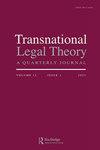COP26的失败之处:利用群体心理和动态来扩大气候减缓和适应措施的采用
Q2 Social Sciences
引用次数: 2
摘要
尽管越来越多的证据表明气候变化的破坏性影响,并且不断呼吁加大减缓和适应气候变化的力度,但各国仍未能采取有意义和具体的措施来实现《巴黎协定》的目标。COP26的结果是通过了没有具体执行机制的承诺,这是这种失败的一个例证。考虑到气候变化的本质以及个人和群体的有限理性,本文运用群体决策的心理学来解释这种不作为。随着时间的流逝,应该动用所有工具来激励各国采取具体而重要的措施,心理学就是其中之一。本文首先阐述了气候变化给理性有限的决策者带来的挑战。然后,它继续考虑在国家政府中发挥作用的群体动力学及其对国内和国际气候治理的影响。本文章由计算机程序翻译,如有差异,请以英文原文为准。
The failures of COP26: using group psychology and dynamics to scale up the adoption of climate mitigation and adaptation measures
ABSTRACT Despite mounting evidence of the devastating effects of climate change and repeated calls to scale up the mitigation and adaptation to climate change, states are still failing to adopt meaningful and concrete measures to meet the targets of the Paris Agreement. The outcomes of COP26, which resulted in the adoption of pledges deprived of concrete implementation mechanisms, constitute one illustration of such failures. Given the nature of climate change and the bounded rationality of individuals and groups, the article applies the psychology of group decision-making to shed light on such inaction. As time is running out, all tools should be mobilised to incentivise states to adopt concrete and significant measures, and psychology is one of them. The article first starts by addressing the challenges presented by climate change for decision-makers bounded in rationality. It then continues by considering group dynamics at play in national governments and their implications for climate governance both domestically and internationally.
求助全文
通过发布文献求助,成功后即可免费获取论文全文。
去求助
来源期刊

Transnational Legal Theory
Social Sciences-Law
CiteScore
2.10
自引率
0.00%
发文量
7
期刊介绍:
The objective of Transnational Legal Theory is to publish high-quality theoretical scholarship that addresses transnational dimensions of law and legal dimensions of transnational fields and activity. Central to Transnational Legal Theory''s mandate is publication of work that explores whether and how transnational contexts, forces and ideations affect debates within existing traditions or schools of legal thought. Similarly, the journal aspires to encourage scholars debating general theories about law to consider the relevance of transnational contexts and dimensions for their work. With respect to particular jurisprudence, the journal welcomes not only submissions that involve theoretical explorations of fields commonly constructed as transnational in nature (such as commercial law, maritime law, or cyberlaw) but also explorations of transnational aspects of fields less commonly understood in this way (for example, criminal law, family law, company law, tort law, evidence law, and so on). Submissions of work exploring process-oriented approaches to law as transnational (from transjurisdictional litigation to delocalized arbitration to multi-level governance) are also encouraged. Equally central to Transnational Legal Theory''s mandate is theoretical work that explores fresh (or revived) understandings of international law and comparative law ''beyond the state'' (and the interstate). The journal has a special interest in submissions that explore the interfaces, intersections, and mutual embeddedness of public international law, private international law, and comparative law, notably in terms of whether such inter-relationships are reshaping these sub-disciplines in directions that are, in important respects, transnational in nature.
 求助内容:
求助内容: 应助结果提醒方式:
应助结果提醒方式:


